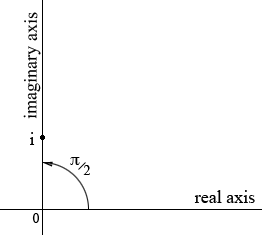| |||
| Math Central | Quandaries & Queries |
|
Question from randomness, a student: i have learnt that 'i' is square root of -1. What is then i^i ? It baffles my maths teacher... Thanks |
Hi,
In many situations with complex numbers, especially when dealing with powers, it is helpful to express the numbers in exponential form. That is express the number as r eiθ = r(cos(θ) + i sin(θ)) where θ is expressed in radians. To do this I usually think of the geometric representation of the number in the complex plane. Using this technique the number i can be written
i = eiπ/2.

Thus
ii = (eiπ/2)i = ei2π/2 = e-π/2
Thus ii is a real number! In decimal form it is approximately 0.207880.
Here is a more algebraic way to see it. De Moivre showed that eix = cosx + isinx so that eiπ/2 = cos(π/2) + isin(π/2) = i, for example. Thus to look at ii one could consider ii = (eiπ/2)i and that's the same as e(iπ/2)i = e(i2)(π/2) = e-π/2.
Penny
Hi,
Since sine and cosine are periodic with period 2π, for any integer n
ei(2nπ +π/2) = cos(π/2 + 2nπ) + isin(π/2 + 2nπ) = cos(π/2) + isin(π/2) = i
Hence ii has infinitely many values, e2nπ -π/2 for n any integer. The valuse closest unity being approximately
(..., 0.0003882, 0.2079, 111.32, 59609, ...)
RD
 |
||
Math Central is supported by the University of Regina and The Pacific Institute for the Mathematical Sciences.